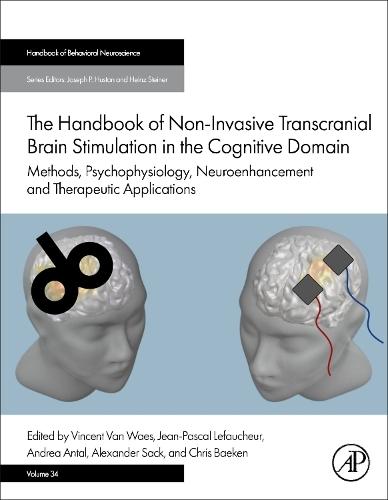Overview
The Handbook of Non-Invasive Transcranial Brain Stimulation in the Cognitive Domain serves as an essential resource, capturing the latest advancements and scientific insights into non-invasive brain stimulation methods. This comprehensive volume delves into various techniques such as repetitive transcranial magnetic stimulation and low-intensity transcranial electrical stimulation. It highlights their application in understanding psychophysiology and enhancing cognitive performance in both experimental models and healthy individuals. Such methods offer substantial promise in unraveling the complexities of neural network dynamics and cognitive functions. In addition to discussing foundational methods and experimental models, the book also explores therapeutic applications for neurological and neuropsychiatric disorders. These multimodal brain stimulation approaches present innovative avenues for potential treatments. By integrating both theoretical and practical perspectives, this handbook not only reviews existing data but also opens new horizons for future research and clinical applications, providing invaluable insights for professionals in the field.
Full Product Details
Author: Vincent Van Waes, PhD (Université Bourgogne Franche-Comté, France) ,
Jean-Pascal Lefaucheur, PhD (Hôpital Henri Mondor, France) ,
Andrea Antal, PhD (University Medical Center Göttingen, Germany) ,
Alexander T. Sack, PhD (University of Maastricht, The Netherlands)
Publisher: Elsevier Science Publishing Co Inc
Imprint: Academic Press Inc
Weight: 0.450kg
ISBN: 9780443266027
ISBN 10: 0443266026
Pages: 640
Publication Date: 01 November 2025
Audience:
Professional and scholarly
,
College/higher education
,
Professional & Vocational
,
Postgraduate, Research & Scholarly
Format: Hardback
Publisher's Status: Forthcoming
Availability: Not yet available

This item is yet to be released. You can pre-order this item and we will dispatch it to you upon its release.
Reviews
Predicting brain activity is important for diagnosis. Controlling it is critical for disease. There are only a limited number of ways brain activity can be controlled non-invasively, each with advantages and shortcomings. These critical issues are debated in the didactic chapters of this volume, contributed by top experts in these fields, covering transcranial magnetic and electrical stimulation and ultrasound stimulation. The principle of “primum non nocere” (first, do no harm) is discussed by several authors, emphasizing the need to learn more about the mechanisms of these methods. The reader will walk away with the important message that non-invasive perturbation, especially its closed-loop (on-demand) version, is on its way to effectively compete with pharmaceuticals with much fewer side effects. -György Buzsáki, MD, PhD. Author of the Rhythms of the Brain (OUP, 2006).
Author Information
Vincent Van Waes graduated from the University of Lille, France, with a Master degree in Cognitive Science. He earned in 2008 the PhD degree in Neuroscience from the University of Lille, France, in collaboration with the Sapienza University of Roma, Italy (European Label). Following postdoctoral work at the Department of Cellular and Molecular Pharmacology of the Chicago Medical School, North Chicago, USA, he joined in 2010 the University of Bourgogne-Franche Comté, France as a Research Assistant Professor (Maître de Conférences) in the Laboratory of Integrative and Clinical Neuroscience and was appointed Full Professor in 2017. Jean-Pascal Lefaucheur is a university Professor and Hospital Practitioner at CH Henri Mondor. His interest is in developing innovative therapeutic strategies, both pharmacological and neurostimulation-based, that could correct neurological disorders. Andrea Antal graduated from Attal Jozsef University of Szeged, Hungary, in Biology. She earned her PhD in 1998 in Biological Sciences from the University of Szeged, Hungary. She has an extensive background in research and training in the fields of neurology and clinical neurophysiology. Beginning in 2001, she has had a pivotal role in establishing and coordinating the activities of the visual laboratory, and later the pain laboratory in Göttingen. She is the head of the Non-Invasive Brain Stimulation (NBS Lab) laboratory at the University Medical Center Göttingen, Germany an experienced researcher in the field of cortical plasticity and brain stimulation, with a H-Index of 70. Alexander T. Sack graduated from Frankfurt University, Germany with a Master of Science in Psychology (2000) and PhD in Natural Sciences (2003). He completed several international postdoctoral and academic research positions before being appointed as Professor of Brain Stimulation and Applied Cognitive Neuroscience at the Faculty of Psychology & Neuroscience, Maastricht University, The Netherlands in 2011. As the Principal Investigator of the research section “Brain Stimulation and Cognition at the Maastricht Brain Imaging Centre, his research focuses on the neurobiological and psychological principles underlying attention, learning, memory, and cognitive control; combining various brain research techniques, ranging from psychophysics and eye-tracking, to functional Magnetic Resonance Imaging (fMRI), Electroencephalography (EEG), and Noninvasive Brain Stimulation (NIBS). His group pioneered the development of simultaneously implemented TMS-fMRI-EEG during cognitive behavior, allowing to apply brain-stimulation while recording the individual brain network (fMRI) and oscillation (EEG) responses of cognitively engaged participants. This multimodal brain stimulation approach allows to investigate the neural network dynamics underlying human cognition in healthy volunteers and to translate these findings into clinical applications for treating various neurological and neuropsychiatric brain disorders. Chris Baeken is currently a professor at the University of Ghent. He also works as a psychiatrist specializing in the neurobiological field of Affective Disorders.



